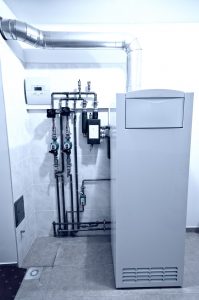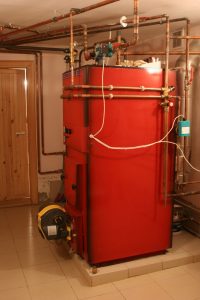 Lots of people are used to one type of heating system or the other. They may always set the temperature on the thermostat without ever really thinking about the system heating the home. If you don’t know much about the heater you use, you’re not alone.
Lots of people are used to one type of heating system or the other. They may always set the temperature on the thermostat without ever really thinking about the system heating the home. If you don’t know much about the heater you use, you’re not alone.
Today, we’re here to answer one of the most basic, but most common questions about heating: what’s the difference between a furnace and a boiler? Let us know how else we can help. Call us for quality heating service in Union, NJ.
Furnaces Heat the Air
A furnace is what’s known as a forced-air system. That means that it changes a home’s temperature by heating the air in the house and moving it out through ducts to vents in various rooms. That involves a blower fan, of course, along with a combustion box to heat the air.
Natural gas, heating oil, or even electricity may be used for heating. With an electric furnace, electric resistance heating is used to warm coils, also known as heating elements, and air blows over the coils to heat it up. These systems can cost a lot to run in a colder climate due to the high cost of electricity in most places, but they are relatively cost-effective at installation.
Gas furnaces use the combustion of fuel to generate heat. While standing pilot lights were used in the past, electronic ignition is the norm now. With this type of ignition system, the burners light up only when the thermostat calls for more heat, moving heat into a heat exchanger. Air moving over this heat exchanger warms up, while byproducts like carbon monoxide vent through a flue that leads outdoors.
Boilers Heat Water
So what’s different about a boiler? Well, quite a bit. A boiler is a tank that heats water. Pumps circulate water through a set of pipes. The pipes may lead to a radiator or a baseboard. In this case, you’d feel heat emitting through this endpoint. Otherwise, the pipes, laid out underneath the floorboards, radiate heat directly to the people and objects in the room.

So Which Is Better: Furnace or Boiler?
Explaining the differences of boilers and furnaces is easy. Comparing the benefits of each is the tough part. Furnaces are the better choice for many homeowners.
- Furnaces are often less expensive to install.
- Installation is also convenient if a duct system is already in place.
- A furnace may heat the air faster, depending on the size of the home.
The main reason people avoid boilers is cost. A boiler might be preferable for these reasons and more.
- The heat you feel from a boiler is more comforting. Heat radiates directly into a room, rather than dissipating from the air.
- Boilers tend to be more efficient. Water is a more efficient heat transfer source than air, and modern boilers work at higher efficiency ratings than ever before.
- Maintenance can be completed a little less frequently with a boiler, since it has fewer moving parts.
- Air quality could improve with a boiler. Furnaces move air, which also moves dust and other allergens, even with a filter.
For boilers or furnaces in Union, NJ, call Max Sr & Paul Schoenwalder Plumbing, Heating and Air Conditioning, A Corp. We are family-owned and operated, with over 104 years in business.
